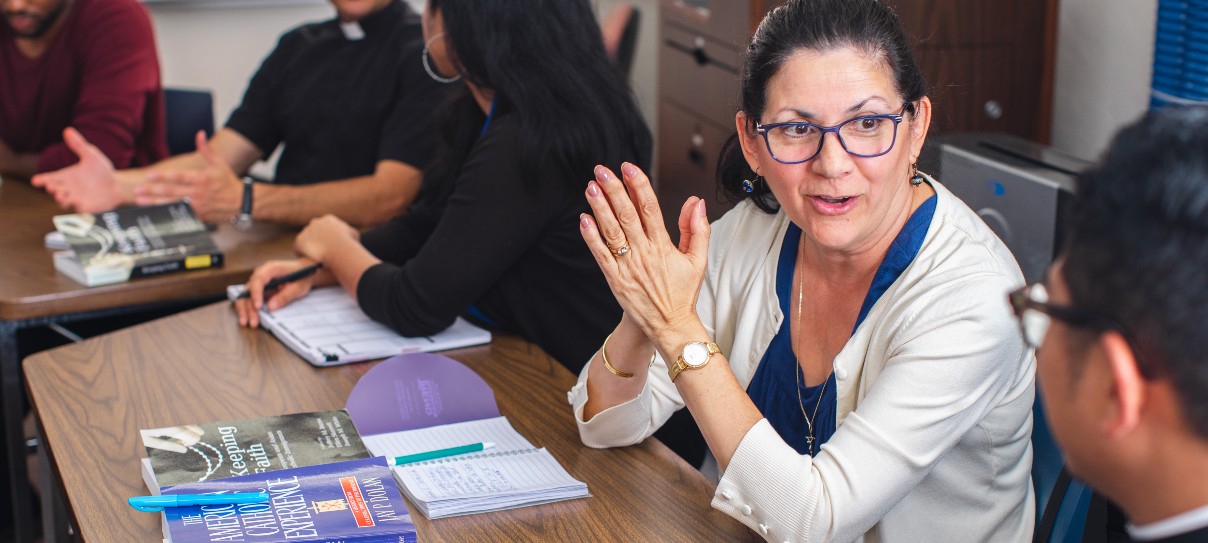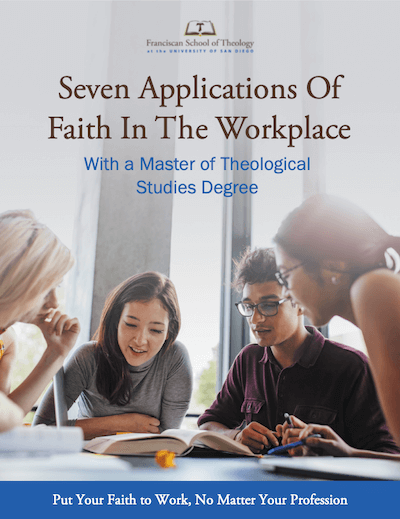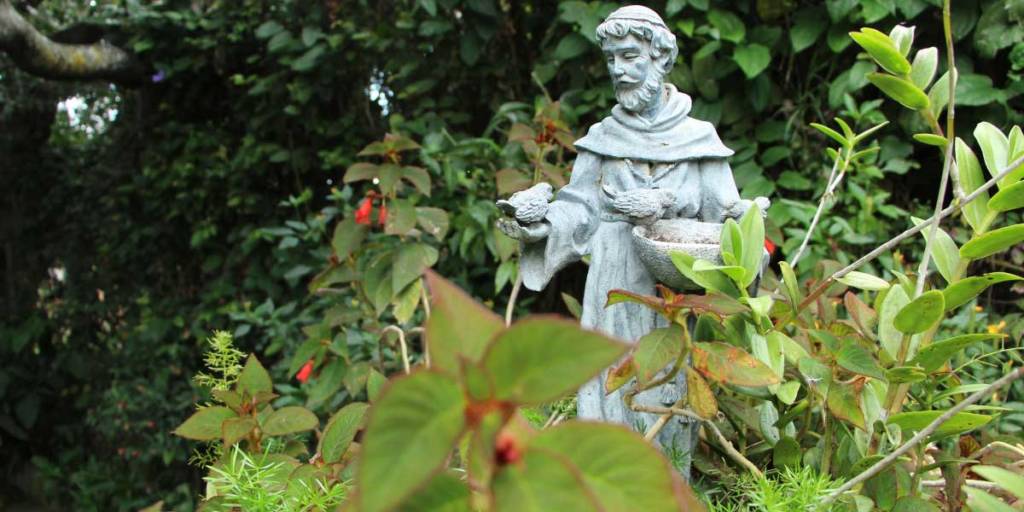To begin a comparison of catechesis, apologetics, and theology, we must first acknowledge that each is intended for different purposes. All are instructional disciplines that pertain to the examination of the Christian faith, but each has a very different relationship to faith teachings.
At the highest level, the three disciplines can be summarized thus:
- Catechesis introduces and teaches the faith to the people.
- Apologetics discusses and defends the faith against those who don’t understand or agree with it.
- Theology attempts to gain a deeper understanding of the faith.
Those who study faith should familiarize themselves with each discipline, as each plays a distinct role in the life of a Christian.
What is Catechesis?
In Christianity, catechesis is the foundational religious education of both children and adults that includes teaching the Christian doctrine. In his Catechesi tradendae, published in 1979, Pope John Paul II explains that the “primary and essential object of catechesis is… ‘the mystery of Christ,’” and that “catechizing is, in a way, to lead a person to study this mystery in all its dimensions.” In the Catholic church, catechesis takes the form of the Confraternity of Christian Doctrine (CCD); in Protestant churches, children attend catechetical Sunday School.
Taken from the Greek word katēcheō (“to be instructed”), the practice of catechesis grew out of the perceived need to standardize basic religious education of the faithful and to aid in the conversion of non-Christians in the late Middle Ages (AD 1250 to 1500). As Christian denominations formalized following the Protestant Reformation, catechesis came to be known as the institutional education of baptized members of the Catholic church.
Today, anyone engaged in delivering Catholic religious education and formation is called a catechist, while the person receiving the instruction is a catechumen. Catechesis is delivered by bishops and other members of the clergy, lay ministers, and others who have received appropriate formation and training. Parents, grandparents, and other relatives are usually the first teachers of the faith to children through their guidance and presence as role models.
“When we grow up, we learn about life from the people around us,” explains Father Michael Blastic, OFM, Ph.D., distinguished visiting professor of Franciscan Studies at the Franciscan School of Theology. “We learn about the meaning of life, and what is right and wrong, from our immediate family. It’s in the context of growing up that we first begin to learn about God and our faith. That’s where the role of catechesis comes in.”
Fr. Blastic relays a story from his own childhood. “As I was growing up, my [Polish] grandfather lived with us, and one of the things he frequently said to us was ‘Bóg cię kocha,’ which means ‘God loves you,’” he recalls. “Very early on, I remember learning what that meant — I was basically taught by my grandfather and my parents that God loved me.” He explains that, when children go on to attend Catholic school or receive further religious education, they are given more information about the faith through formal catechesis.
Catechumens study the Gospel as part of their education or conversion, until such time as they can receive the sacraments of initiation (baptism, confirmation, and the Eucharist, or Holy Communion).
Catechesis can also cover the purpose of a particular Catholic tradition, such as the Benedictine, Augustinian, or Franciscan charism.
The Second Vatican Council (Vatican II) revived the use of the ancient Rite of Christian Initiation for Adults (RCIA), the catechetical process through which non-baptized men and women can become members of the Catholic church.
The RCIA was formally approved for use in the United States in 1974.
Catechesis is much more than gaining a working knowledge of the Scripture and Catholic doctrines; through the catechumenate, the faithful are initiated into true discipleship, understanding what it means to be a follower of Christ. The more knowledge is gained, the more one understands how to apply faith principles to all aspects of their life, thereby amplifying and living out the word of God on earth.
What is Apologetics?
Apologetics is the intellectual defense of religion, used to respond to objections and misinterpretations of faith by the uninitiated. Apologetics appears often in Christian theological debates, combining philosophy and catechetical knowledge to present a rational case for Christianity. The term comes from the Greek word apologia, which means “speaking in defense.”
When a catechumen completes their formation and begins to receive the Eucharist, they may find themselves occasionally engaged in apologetics. Catechists and theologians may also use apologetics in their teachings, since the defense of religious doctrines requires an in-depth knowledge of the faith.
Christians may feel compelled by Scripture to practice apologetics — not as a way to proselytize, but as a way to remove obstacles to a better understanding of faith. In the Christian New Testament, the apostle Paul cautions the wayward Colossians, “Conduct yourselves wisely toward outsiders, making the most of the opportunity. Let your speech always be gracious, seasoned with salt, so that you know how you should respond to each one” (Colossians 4:5-6).
Practicing apologetics can help Christians answer questions like, “How do you know God exists?” or “Is there actually a heaven?” Besides preparing the faithful to respond to agnostics or atheists, apologetics inspires spirited and sometimes useful debate in theological and catechetical circles.
“When I got to college, it was probably the first time I lived in an environment with people from different religious backgrounds — and no religious backgrounds — and at times, my belief in God would be challenged,” Fr. Blastic recalls. “I remember my grandfather teaching me that God loves us, but some fellow students would disagree with that and say, ‘How could God be a loving God when there’s so much suffering and so many tragedies in the world?’”
Fr. Blastic used what knowledge and understanding he had at the time to defend his faith (“in a very primitive way,” he admits). “Doing that is apologetics — it’s trying to defend what you believe in,” he explains. “It was in theology that I learned the background to what I believed and what I tried to defend in terms of my faith.”
What is Theology?
“If you want to be a good catechist or apologist for the faith, you really need to study theology,” says Fr. Blastic. “Theology will give you the means and the tools to understand what we teach and what we are defending.”
Theology is a discipline that delves deeper into the study of religion than catechesis, examining the intellectual, philosophical, historical, cultural, and even ecological implications of faith. Those who study theology seek to understand religious thought as expressed through worship, traditions, literature, and art, as well as how the divine relates to our world today. With a strong emphasis on academic analysis and discussion, theological studies applies many disciplinary lenses, including history, scripture studies, philosophy, and ethics, to the metaphysical questions posed by the faithful and non-faithful alike.
“The Medievals talked about theology as ‘faith seeking understanding,’” explains Fr. Blastic. “Theology doesn’t stop just at presenting what we believe… but it also enters into reflecting on how [it is] that we came to articulate our belief in that way.”
Unlike catechesis, theological studies is accessible to those outside of a particular faith, as it offers more of an outside-in approach. There may be elements of catechesis and apologetics within theological studies; but an important fundamental aspect of theological studies is daring to question interpretations of and arguments for faith.
“Theology also helps us to understand our faith in different moments of history,” says Fr. Blastic. “Today we live in a world that has different questions, different experiences, and different problems than it had fifty years ago. Theology tries to understand the faith… using the means that are available to us today, in terms of science, philosophy, literature, whatever it might be — again, to help us to unpack the fullness of our faith for our time, for our place.”
Those who wish to study theology in a formal academic setting may explore earning a master’s degree in the field. Doing so may also prepare someone to become a catechetical leader or other religious educator. With a Master of Theological Studies (MTS), graduates may become qualified to teach theology or religious studies at the elementary, high school, and community college levels, in their parish, or to enter a profession in college or youth ministry.
Approaches in Catholic Instruction
Since the purpose of Catholic catechesis, apologetics, and theology is so varied, students of each may encounter them in entirely different contexts. The delivery also depends heavily on what the intended audience needs to know: whether they are seeking information about their faith, answers to metaphysical questions, or intellectual discussions of ethical conundrums.
“Theology, I think, is really important for being a good catechist. In a similar way, apologetics needs to be nurtured and supported by an understanding of the faith,” explains Fr. Blastic. “Certainly, we can quote Scripture, we can quote [theological] authors, but when you really get into significant discussions with people who disagree or don’t believe, [and] the more you’re able to articulate your understanding of the faith, the more you’re going to help that other person understand why you believe what you believe.”
While theology often approaches faith from the outside, Catholic catechesis and apologetic instruction follows one of two frameworks:
Top-Down:
Common in catechesis
- Approaches faith from a high level
- Explores and examines concepts within that faith and connects them to specific doctrines and topics in the Scripture
- Can be learned by how others live their faith
Bottom-Up:
Common in apologetics
- Addresses specific topics or arguments directly, often common objections to the faith
- Predicated on the fact that all parties share some understanding of the faith
- To give a satisfactory explanation (defense), the apologist must seek to eliminate misconceptions and misunderstandings.
These two approaches can be seen in the common ways Catholics learn about their faith — either from their parents, family members, or fellow parishioners (top-down), or in a more formal academic setting (bottom-up). But in order for anyone to deliver effective instruction in either discipline, a deep understanding of the faith is critical.
“We’re all called to spread the faith and defend the faith, and theology is really essential to do that well,” says Fr. Blastic. “Because if you don’t understand the faith, it’s very difficult to defend it.”
Comparison Table: Catechesis vs. Apologetics vs. Theological Studies
These three approaches to faith do not always lend themselves to straightforward comparison, but there are some cases in which you would encounter one over the other.
| Catechesis | Apologetics | Theological Studies | |
|---|---|---|---|
| Definition | Fundamental religious education that introduces and teaches the faith to the people. | An approach to religious debate that discusses and defends the faith against those who don’t understand or reject it. | An academic approach to faith that attempts to gain a deeper understanding of its implications. |
| Application Where would you use it? | Part of the process for joining a religious institution. Ex.: Confraternity of Christian Doctrine (CCD), RCIA, Sunday School | In intellectual arguments (written or oral) to defend the faith. | In an academic setting to study, explain, and understand the faith |
| Goal What is the purpose? | To gain a fundamental understanding of the faith. | To eradicate misconceptions or misunderstandings about the faith. | To gain a deeper understanding of the faith from multiple perspectives, including historical, cultural, philosophical, etc. |
| Method of Instruction How would it be delivered or led? | In or for a religious institution by members of the clergy, lay ecclesial ministers, certified/trained parish volunteers, parents to their children, etc. | Either in/for a religious institution or an academic setting. | In an academic setting by university professors, published theologians, lay ecclesial ministers, theological philosophers, theological studies graduates, etc. |
Apologetics, Catechesis & Theology in Today’s World
Fr. Blastic maintains that, to be a good catechist or apologist, one must first build a strong theological foundation. “If you want to teach religious education, you might not need a master’s degree in theology, but you do need to understand the faith,” he says. “You have to know something about how we came to express our faith in this way. That’s what theology helps us do — understand how we came to this description of who God is, how God acts, and how God loves.”
See overview: University of San Diego – Master of Theological Studies
Of course, all three disciplines stay relevant by adapting to the times. The online Master of Theological Studies – Franciscan Theology program at the University of San Diego approaches all matters of faith from a contemporary perspective, using of-the-moment examples to strengthen arguments and connect them to today’s world.
Students in the MTS program are challenged to find contemporary approaches to faith, as well as theological perspectives that account for modern society and social norms. All course subject matter is taught through the lens of Franciscan theology, a joy-filled Catholic tradition that promotes a life of active service, solidarity, and compassion for the marginalized. Led by world-class faculty with decades of lived experience, students are supported by like-minded individuals from all backgrounds who seek to understand and deepen their connection to their faith.
To learn more, ask questions, and gain a better understanding of the online MTS program, reach out to an enrollment advisor today.




